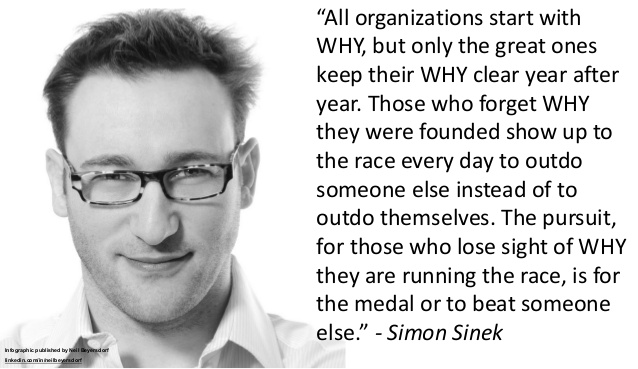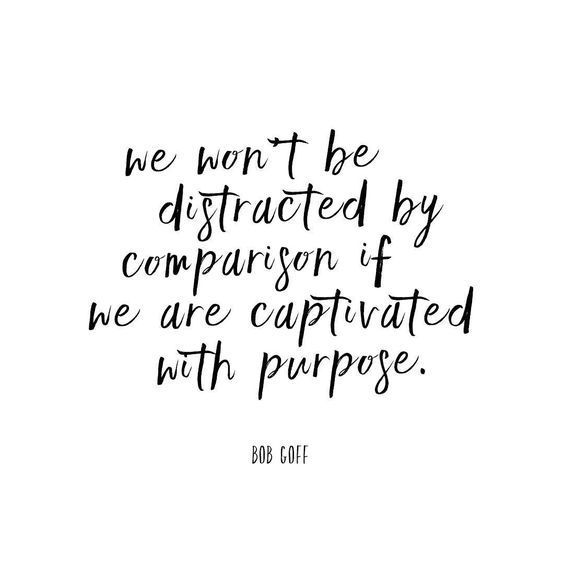One thing for which I’ll forever be grateful to IIT Bombay is the opportunity it provided me to work with some excellent leaders. During my stay at IITB, I worked in NSS and the Student Satellite Team. Both have grown exponentially in the last 4-5 years, and helped me grow along. A big chunk of this growth could be attributed to the strong leadership in the two teams.
But then, what do I mean by ‘strong leadership’? There are several attributes, I’ve learnt, of strong leaders. However, the one that I’m referring to in the present context, which often becomes the true hallmark of a great leader, is the ability to inspire people to work towards a common purpose.
Simon Sinek, in his book ‘Start with Why’ has beautifully explained how, be it a social movement or a corporate organization, the leaders who have created the greatest impacts have also been the ones who have given the people working with them a clear purpose.

When organizations forget their purpose, then incentives become the only reason people work for them. There is nothing wrong with incentives in general. But when incentives become the only reason people work for an organization, the relationship of people with the organization becomes very fragile. People lack the inspiration to work, to walk the extra mile, to push themselves harder. They become content by doing the bare minimum to get the required incentives. It just takes a slightly stormy weather to rip this fragile relationship apart. Within the institute, people get a number of incentives to work for the various institute bodies. The most common of them would be a resume point. Others would be free coupons, treats, freebies etc. “Maine kuch nahi kiya, fir bhi orgi badge mil gaya”, “Maine hardly 3-4 sessions attend kiye, fir bhi PP grade mil gaya” would be some freshie quotes many might have heard.
Of course, in all the insti bodies, there would be people who are inspired enough, who don’t care about incentives even when the leadership isn’t sure of its purpose. And the converse is also true. However, the percentages are starkly different in the two cases. Something magical happens when the leaders have a clarity about their purpose and when they can communicate it effectively. The flow of energy, enthusiasm, passion and power in every organization is top down. When the leaders know the answer to their ‘Why’, and can pass it down effortlessly, people in the organization get started on a mission, they get a sense of empowerment. The purpose makes life meaningful. People no longer work to make their bosses or their managers happy. They work for themselves, while still staying within the framework and structure of the organization. The organization’s success is their success, no matter at what level in the organization they work. No matter what benefits of the success they’ll receive. Only in such an organization would an employee at the lowest hierarchical level fearlessly question the top leadership. Because the employee isn’t working to please the leadership to gain incentives. The employee is working towards a purpose and wants to ensure s/he reaches there.
President John F. Kennedy was visiting NASA headquarters for the first time, in 1961. While touring the facility, he introduced himself to a janitor who was mopping the floor and asked him what he did at NASA. The janitor replied, “I’m helping put a man on the moon!”
When the people work towards a purpose, they hardly get affected by rough weather. In fact, they enthusiastically take it head on. They are willing to make sacrifices in the process, compromise with their well being, even risk losing everything. The purpose keeps them motivated throughout. Coming back to the point I made in the first paragraph, in both the bodies I worked for, the leadership provided a strong purpose for me to work towards. In the satellite team, the efforts were always directed towards the short-term purpose of taking IITB into the space age/ launching our own satellite, the long-term purpose of converting IITB into a Center of Excellence in satellite and space technology and the still broader purpose of uplifting the science and technology sector of India. I don’t think working for a resume would have compelled people to make the sacrifices illustrated in The Making of Pratham Satellite. Similarly, in NSS, my immediate purpose in the initial years was to contribute my bit to fighting illiteracy/ bringing in quality literacy and the larger purpose was to utilize the time and skill-sets of the volunteer pool towards the enrichment of the society and the environment, and also provide NSS the reputation and importance it deserves within IITB and otherwise.
I was lucky in the sense that both of these bodies were low on incentives during my early years at IITB. So the negative peer pressure of people working just towards incentives was largely missing (people looking just for incentives would generally migrate towards bodies where they’d get a lot of them). This negative peer-pressure can have strong effects. Eventually, thoughts start cropping up in your mind. “They hardly worked as much as I did, their work hardly had any meaningful impact, yet they have a stronger PoR, a better internship, a better job. Perhaps I should have also worked towards my resume.”

Even while reading the above paragraph, for once, you’d have thought that the dilemma was justified. What’s the point of working towards a purpose when others are doing better off working just for incentives. Well, the problem with working for incentives is that you’d never have the contentment of doing something meaningful. You might even fall in the trap of, what I call, the ‘elite mediocrity’, where you’ll be elite thanks to all the incentives and yet utterly mediocre, having done nothing satisfying, nothing out of the ordinary, nothing noteworthy, just the normal stuff that gets done year on year to get the requisite incentives. Give me the highest package in IITB in exchange of the feeling I got on the day Pratham launched or the day MHRD approached NSS to partner with them, and I’d choose that feeling a thousand times over.
Of course, people cannot be split into two categories: those working towards a purpose and those working for an incentive. Many keep switching between the two at different points. Many a times, even the choice is not available to people, and they are compelled to work for incentives. This post, however, is for those who aren’t under any such compulsions.
So what’s the conclusion of all this? What’s the learning after all? Quite simple. If you are in a leadership role, make sure that you are clear about your ‘Why’ and train yourself to communicate it better. Of course you can create more incentives for people working in your organization, but they should always be secondary to the purpose. And if you aren’t in a leadership role, then first try to find out what you really want to do, forgetting about all the incentives. If you still can’t decide and yet are desperate to work in an organization, work for an organization which can add meaning to your life. Don’t run behind incentives. They can only offer short term pleasures.


Extremely Well Written Mate!! Keep it Up:)
LikeLike
Thank you 😀
LikeLike